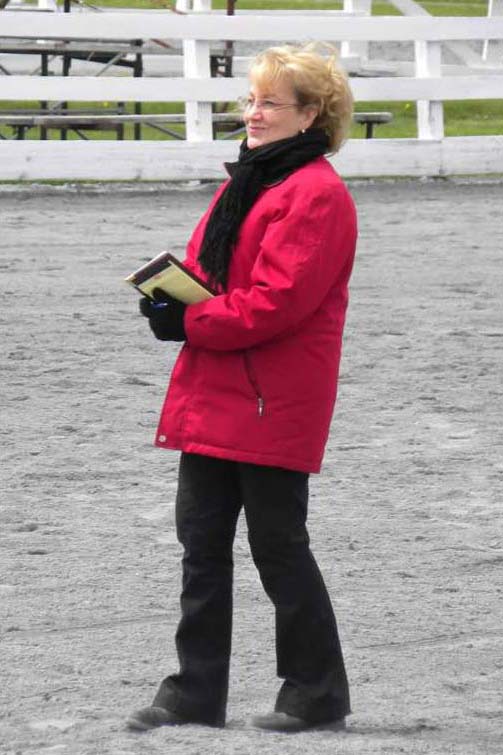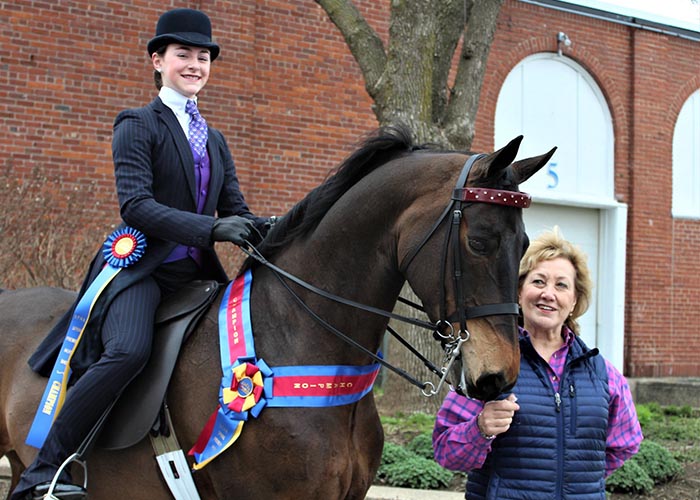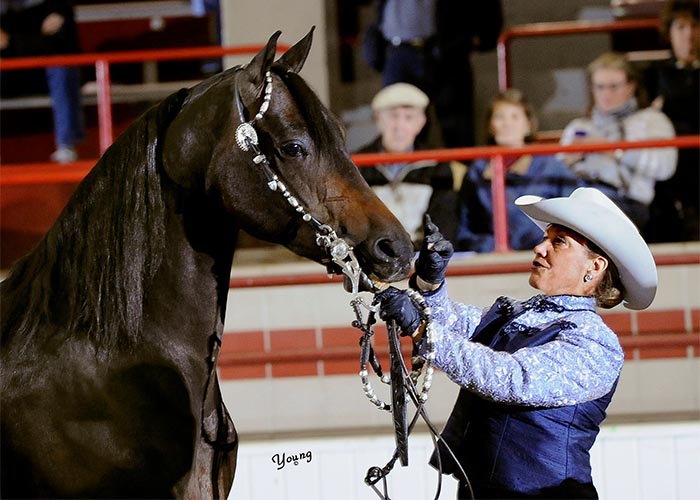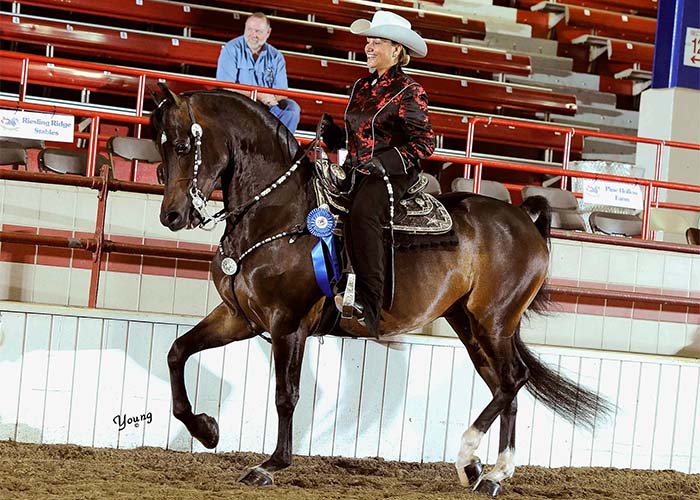
Chris Cassenti is a familiar face on the New England show circuit, as the manager and lead trainer at Chrislar Farm, Rowley, MA; a licensed United States Equestrian Federation (USEF) Morgan and Saddleseat Equitation judge; and an accessible New England Horse Council (NEHC) judge (holding cards for both English and Western). She is a longtime Massachusetts Licensed Riding Instructor and a member of the American Morgan Horse Association, United States Equestrian Federation, New England Morgan Horse Association, United Professional Horsemen’s Association, Chapter 14, New England Horse Council, New York State Morgan Horse Society, International Friesian Show Horse Association, American Paint Horse Association, and the American Quarter Horse Association. Chris also serves as a member of the Equine Advisory Committee of the Massachusetts Farm Bureau Federation.
Although she is best known for her Morgan horse show-string and talented equitation riders, Chris and her professional staff of trainers/instructors cater to all breeds and riding disciplines. Chrislar Farm has produced numerous horse-rider/driver combinations that have won World, National, Regional, State, and Local Level Championships. Chris has been voted as the American Morgan Horse Association (AMHA) Woman of the Year and was inducted into the New England Morgan Horse Association’s (NEMHA) Hall of Fame. She has also earned the AMHA Golden Reins Award, which recognizes professionals who have been involved with Morgans for at least 30 years.
With her warm and caring demeanor, Chris continues to educate horse lovers of all ages and ability levels, while helping them achieve their goals. We sat down with her to learn more about her experience as a judge and her all-encompassing horse knowledge.
The Cheshire Horse (TCH): Why did you choose to get your judge’s card?
Chris Cassenti (CC): Well, there’s an interesting question! I grew up sharing my love of horses, all horses, with my dad. I loved lessons as a kid, as well as preparing for and competing in horse shows. We were not able to purchase expensive horses back then, so I would dedicate time and training to one horse, sell that horse for a little profit, and use the money to purchase a nicer horse. My hands-on experience, combined with important mentors along the way, improved these horses, my training skills, and my ability to communicate with many equine personalities. I also enjoyed helping other riders improve their skills in the saddle. Not a surprise that in 1978, with the encouragement, business skills, and support of my husband Larry, here we are at Chrislar Farm, a well-known and well-respected, active training, teaching, and show facility.
I was fortunate to have many influential horse trainers and judges in my life who encouraged me to pursue my career and apply for judge’s cards. They told me, “You know, we need good people out there continuing to judge horse shows. You need to give back to the industry that has been good to you!” Because I was taking students to smaller one-day shows and horse owners to larger rated shows, I realized how critical knowledgeable judges were to the equine industry in order to keep horse shows alive.
Judging is not a high-paying job; I personally enjoy judging as part of my passion. I enjoy observing competitors (young and older) in the ring, appreciating success and sometimes disappointment, but relishing the whole show ring “experience”! I enjoy offering encouraging words, speaking with competitors at the end of a horse show about their rides and their horses.
TCH: What has been your most memorable judging experience?
CC: I remember judging in Deerfield, NH, at a large open show. A talented young equestrian with a very fancy but inexperienced horse came into a very large class, making a great first impression. As the class progressed, the horse became an absolute orangutan! I didn’t know this rider, but I was proud of her for maintaining her composure and patience throughout the whole class. She tried to keep him focused and kept riding no matter what he was doing underneath her.
After the class was over and I had turned in my card, I walked down the line and stopped to talk with this rider. It was a large class, so I think we both knew that she wasn’t a contender for the ribbons. I told her how impressed I was with her ride. I remember telling her, “You have a very handsome and talented horse here… keep up the good work, and he will be a top contender one day.”
That rider and that horse have made some pretty lovely victory passes over the last few years, and I have enjoyed seeing them compete and do well. Perhaps my words of encouragement made a difference? I did not give pointers or training tips; I just let her know she was on the right track. At smaller shows, I enjoy offering words of encouragement where needed and observing horse/rider combinations make progress.

TCH: What do you wish more people knew about being a judge?
CC: Judging requires knowledge of each and every breed and class in the ring, experience with the class specification, and concentration in each class (many times outside in the sun, hot weather, dust, or rain). I care about each placing in a class, not just about the top two riders. A judge is doing their very best in each class to place each competitor properly. One may overhear how judging is “political” or judging is “inconsistent.” However, when the complainer’s horse wins the class, judging is no longer political!
Judging is only as consistent as each horse/rider combination is in each class that is in the ring. A judge’s job is to compare all the horses in the ring to each other. However, a judge can only judge what they see and observe. Many times a judge may be concentrating on a group of horses in front of them and may miss a horse making a terrible mistake behind them (sometimes a competitor gets lucky in that respect).
When judging in a three-judge system, judges are not permitted to stand near one another or speak to one another. I have judged the Morgan Grand National and World Championship Morgan Horse Show multiple times. In that huge competition arena, many times with 20 horses in the ring, each judge is watching their area of the ring… sometimes, it is almost like each judge is judging a separate class! Two judges may have witnessed a huge competition error, and that horse/rider combination is not on those hudge’s cards; but that third judge may not have seen anything but their best moments, causing them to put that combination on the top of their card. This may cause spectators to wonder, “How could that judge pin that horse first, and that combination is not on the other judge’s cards?”

TCH: What stands out to you when you are judging?
CC: Each exhibitor has one chance to make a first impression, and that impression is made coming into the ring! As they enter the ring, I notice the quality and partnership of the horse and rider. I am judging the total picture of horse/rider turnout, relationship, and performance.
There are specifications for each class; some may be different from others. I often call this the “Ingredients.” The list of ingredients, the class specifications, tell the judge things that are more important than other parts of the class. If “Manners” or “Must Back Readily” is at the beginning of the class specs and you have a top rider who cannot back correctly, that could mean second or third place instead of the top prize.
Showing horses is like being a performer on American Idol! Sometimes everyone can sing the song well, but it is also the delivery of the performance and showmanship that will make the winning horse and rider shine!
TCH: What tips do you have for competitors?
CC: Number one: If something goes wrong, don’t give up. You don’t know about the mistakes that other horses and riders are making. So often I see people who make a small mistake and think that the whole class is totally blown for them… I wish that I could tell more people to just keep riding and never give up.
Next, it’s important to be patient and kind to your horse and other exhibitors. Respectful riding goes a long way in the show ring. As an exhibitor, you need to pay attention to what is happening in front of you. Look ahead and plan what you are going to. If you see a pack of horses, cut the ring a little bit earlier so that you are not stuck behind a pack of horses or getting squished on the rail. It is vital to be proactive in your positioning. It’s kind of like driving a car, and you want to make sure that the traffic is flowing and that you have your own space.

TCH: The COVID-19 Pandemic has changed the equestrian landscape, how do you think it will affect horse shows this season?
CC: Well, we closed on March 23, 2020, and we went from 500 students to 0 students in 24 hours with absolutely no lesson income. That gave me a herd of lesson horses who were unemployed and not bringing in any money who I have to support. We slowly reopened the doors at Chrislar Farm per Governor Baker’s orders on May 26, 2020. Because we didn’t know the direction of this invisible enemy (the virus), we resigned ourselves to the fact that 2020 was a year of continued improvement of riding/training/showing skills so that in 2021 we would be better than ever! It was a heavy hit financially, but the health and well-being of my clients took priority.
We did not attend any horse shows in 2020… In fact, our last horse show was in October 2019! We are heading to our first horse show of 2021 in late April. I know my clients trust my judgment, so for me, I feel a self-imposed sense of responsibility to keep them safe. We are making efforts to stay as safe as possible: we have our own camper (so we don’t need a hotel), we have our own truck (so we don’t need to rent a car), and we plan to bring our own food so we do not need to dine out. We all continue to social distance, wear our face masks and disinfect everything.
We have learned to do electronic entries, have made an appointment to check-in at the show office, and we will go above and beyond what’s required to keep everyone safe and protected at the horse show. Our clients and students have followed strict COVID-19 rules and regulations at home at Chrislar Farm and everyone will continue to do so.
At Chrislar Farm, we will follow the horse shows that are moving forward to see what the restrictions are, how they are followed and adhered to, and how this virus impacts those in attendance and the flavor of a horse show experience. Restrictions are being lifted, but that doesn’t mean this virus is going away.
Learn more about Chris and Chrislar Farm by visiting her website.

Wow, Chris, you have certainly given back to the equestrian world ten-fold from when we first met, gosh dare I say, it was like 1989/1990 (my memory is not helping me here). I had no idea! You were certainly revered back then just in the beginnings of Chrislar Farm! I wanted to get back into riding having to put it aside due to college. I loved seeing the Morgan foals your stallion sired each year from your mares, and I enjoyed all my time in the humble beginnings of Chrislar Farm. And here I am today living in NH with my own personal farm with two horses, one that I Event, the other retired from Eventing. You are a role model! Simply awesome!
Chris. I have very fond memories when I boarded Hi C Misty at your farm early nineties. You were always so good to me at the shows by offering me a stall to use between classes. Another fond memory is the day we went to the beach for a ride. A dream come true. I no longer have horses and miss them everyday. Morgans are the best.
Everyone who has come in contact with you and Chrislar Farm has benefitted from you help and expertise.
Thank you